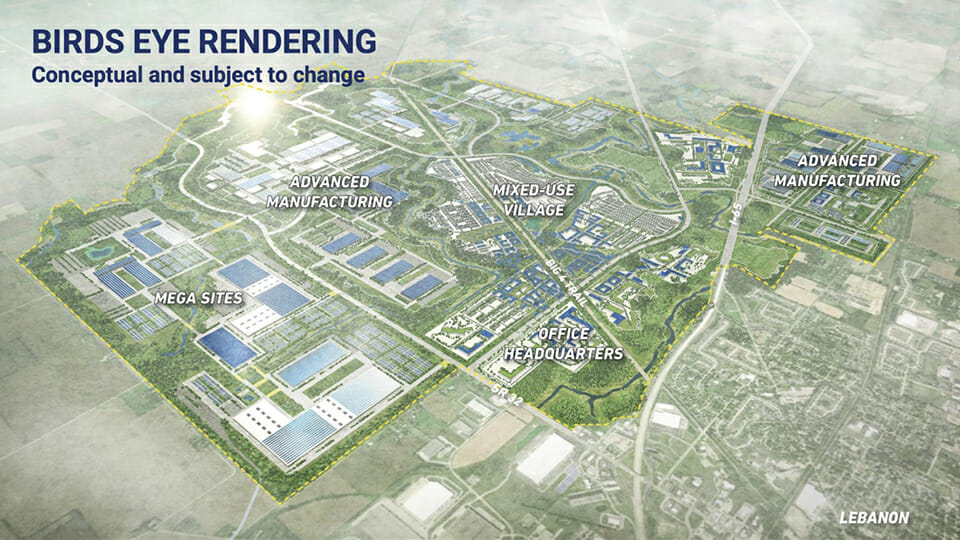Lilly plans 12 buildings at LEAP campus in Boone County
Subscriber Benefit
As a subscriber you can listen to articles at work, in the car, or while you work out. Subscribe Now
A $2.1 billion Eli Lilly and Co. manufacturing campus in Boone County would include 12 buildings totaling more than 1.6 million square feet, a company official told the Lebanon Planning Commission on Tuesday night.
Lilly’s presentation provided more details for its plans announced in May to construct two manufacturing sites that would anchor a new innovation district northwest of Lebanon.
The Lilly campus would include two manufacturing sites called LP1 and LP2. The 12 buildings on the campus would range in size from a 3,200-square-foot visitors center to a pair of three-story, 330,000-square-foot manufacturing facilities.
The Indianapolis-based drugmaker has said the 600-acre project would create up to 500 jobs, along with up to 1,500 temporary construction jobs, at the LEAP Lebanon Innovation and Research District.
The Indiana Economic Development Corp. has identified about 11,000 acres in Boone County for the large-scale research and innovation park due to its location between Indianapolis and Purdue University and its proximity to I-65.
Lebanon has already annexed about 6,600 acres for the LEAP site. LEAP is short for Limitless Exploration/Advanced Pace.

The Lilly site’s buildings would include uses ranging from administrative offices, lab space, manufacturing, utilities, warehousing and a fire station. The planned facility areas would take up about 200 to 300 acres, leaving room for possible future additions to the Lilly site, along with landscaping, open space and buffer areas.
Jennifer Massey, associate vice president for manufacturing at Lilly, told the planning commission that work at LP1’s four manufacturing buildings would be focused on manufacturing API molecules. API stands for active pharmaceutical ingredients.
“That’s what does the magic in the medicines, and so that is what produces the therapeutic effects,” Massey said. “So it is a very important part of what we do making APIs.”
Massey said LP2 would be a cell and gene therapy site that would provide cutting-edge medicines for patients.
“In combination, the two sites together will be providing medicines for patients that are facing cancer, diabetes, and other serious illnesses,” Massey said.
The location of the LEAP district would provide Lilly with a manufacturing site that is near its headquarters in Indianapolis, Massey added.
“That offers broad employee development opportunities between the sites,” Massey said. “And the campus here also brings us closer to Purdue, who is a very good partner in the STEM areas for us and for the state overall.”
The Lilly campus would be bounded to the north by County Road 450 North, to the west by Interstate 65 and to the east by the CSX railroad tracks. The campus’ southern border would be north of County Road 300 North, which would connect to Witt Road, and County Road 375 North.
The project as it is currently designed would require Witt Road, which currently runs through the middle of the site, to be cut off from the north at County Road 450 North and from the south at County Road 375 North. Residents have expressed concerns about the plan to close Witt Road near the Lilly campus.
The planning commission will vote on whether to recommend the site plan and the vacation of Witt Road at its next meeting on Feb. 21. The Lebanon City Council will vote on whether to issue final approval at a future meeting.
Lilly plans to begin construction this spring and hopes for the site to be operational by 2026 or 2027.
In October, the Lebanon City Council approved an agreement that would reserve water and wastewater for the Lilly development.
The memorandum of understanding between Lebanon Utilities and the Indiana Economic Development Corp. would pre-allocate 864,000 gallons per day of water and 864,000 gallons per day of wastewater for Lilly once construction is complete.
State officials are also exploring the feasibility of transporting up to 100 million gallons of water a day through a 35-mile pipeline to carry water to the LEAP district from the Wabash aquifer in Lafayette.
Last week, a group of Boone County residents filed legal action against the city of Lebanon, accusing the municipality of violating state and local zoning law when it annexed 5,200 acres of land and created a new zoning district for LEAP.
